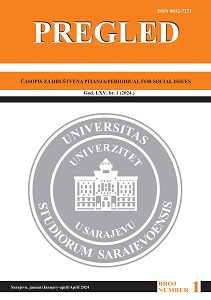Pozicija religije u digitalnom dobu
Position of Religion in Digital Age
Author(s): Nezir Krčalo, Adnan DžafićSubject(s): Media studies, Religion and science , ICT Information and Communications Technologies, Sociology of Religion
Published by: Univerzitet u Sarajevu
Keywords: faith; religion; symbols; community; digital religion;
Summary/Abstract: Whenever the topic of religion is in question, Heraclitus' thought about the "logos" in the world that "neither hides nor reveals itself" comes to the fore. According to him, "logos" is the universal principle of the cosmos, the principle of the unity of opposites, and to know it one must make a mental effort, which is nothing but the light of faith as such. The "Logos" is the "cosmic connector" and is operative in all things because it unites the two opposite poles, God's speech, and the world. The world is nothing but "symbolic speech of God". Human imagination has the ability to clothe the spiritual ("logos") in sensory form (logic). The interpretation of symbols is based on deepening their contents and enriching their meanings through scientific research and scientific knowledge. The symbolic language of the keyboard (digital religion) is not suitable for such a thing. Religion, as a variable social phenomenon prone to diffusion, is favored by the digital age in its mission, not knowing what consequences it will experience in the foreseeable future. In order to master the ideas of individuals, by inversion, he wants to present the "external activity" with faith as such, to enter the subjective world of the individual and his intimacy with God. Just as language is the medium of thought, religion is also the medium of faith. In the digital age, man becomes the medium of the media.
Journal: PREGLED - časopis za društvena pitanja
- Issue Year: LXV/2024
- Issue No: 1
- Page Range: 19-29
- Page Count: 11
- Language: Bosnian

